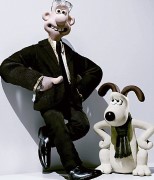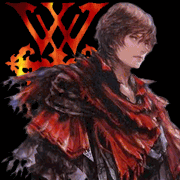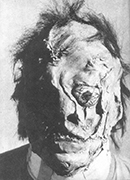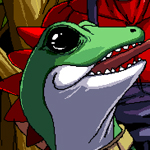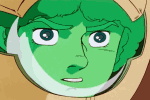|
Here's one of my favorite Vance passages:quote:Faucelme returned, shaking his head in puzzlement. He seated himself in his chair and resumed his reading. Cugel came up behind him, looped the rope around his chest, again and again, and it seemed the rope would never exhaust the coil. Faucelme was presently trussed up in a cocoon of rope. Much better than Pratchett, imo.
|
|
|
|

|
| # ? May 30, 2024 06:49 |
|
Good choice, that was something I'd figuratively earmaked for the eventual review. Still writing about another book though.
|
|
|
|
BravestOfTheLamps posted:On a re-read? I think I was really high the first time I read Eyes of the Overworld ok also I went right into it after finishing the short stories and was expecting more Guyal of Sfere and less Liane the Wayfarer - the Dying Earth short stories alone are good evidence that Vance wrote some nicely varied protagonists my bony fealty fucked around with this message at 22:18 on Oct 12, 2017 |
|
|
|
my bony fealty posted:Cugel stories are really great on a re-read because you realize, this guy's a dumbass and also a really bad dude. Rapist, murderer, thief, trickster, etc. But he's so likable! Sold a woman into sex slavery to barbarian savages too. The same one he raped. The only positive things I remember about Cugel are that when he took that wizard's mansion early on he did do some things for the locals and that at the end of the book he's had a realisation he's not the cleverest there is and finally doesn't try to gently caress over some erstwhile allies. It was a long time coming. Honestly the only reason Cugel's saga isn't loving horrifying is because almost everyone else he deals with is just about as much of a lovely turd and the only victim for whom I felt unmitigated sympathy was the aforementioned rape victim. I remember reading that bit the first time and thinking 'Hold on a moment this is pretty hosed up, she wasn't even that bad of a person to at least somewhat mitigate this, this is ruining the vibe'. Also condolences to BravestoftheLamps who's taken a bullet in the comics forum for having political views that aren't completely at one with the choir
|
|
|
|
Were those views "comics suck"?
|
|
|
|
I'm currently reading Cugel's Saga for the first time and I'm not even sure on the "likable" bit. Guy is an rear end in a top hat. Entertaining, sure, but an rear end in a top hat nonetheless.
|
|
|
|
|
Cugel is consistently a terrible person except for one incident near the end of Cugel the Clever/The Eyes of the Overworld. We only root for him at the end of The Skybreak Spatterlight/Cugel's Saga because Iucounu is worse, and even that is a retcon. As an aside, am I the only one who finds it weird that no one (even Wikipedia) seems to use the Vance Integral Edition titles? To be sure, some of them are terrible. The VIE titles for Assault on a City and Showboat World are absurdly over-long, Mazirian the Magician makes no sense as a title for The Dying Earth because he only appears in the first story, and there's a fair number of titles that are proper nouns with no meaning outside the context of the story. That said, some of the original titles are worse (Tschai is a meaningless proper noun, but still better than Planet of Adventure). Silver2195 fucked around with this message at 19:16 on Oct 20, 2017 |
|
|
|
Neurosis posted:Also condolences to BravestoftheLamps who's taken a bullet in the comics forum for having political views that aren't completely at one with the choir He was capped in the Zizek forum, for something about disagreeing with the idea that George Lucas is probably an abuser because of things he wrote into Star Wars. Or at least pointing out that's where the idea comes from, I guess?
|
|
|
|
botl owns and these forums need him more than they will ever know
|
|
|
|
the old ceremony posted:botl owns and these forums need him more than they will ever know 
|
|
|
|
wow i just realised he's on probation for a month, fair dinkum mods
|
|
|
|
it was for dropping incendiary takes on marvel comics' sponsorship deal with Nothrop Grumman. the old ceremony posted:botl owns and these forums need him more than they will ever know agreed.
|
|
|
Neurosis posted:Sold a woman into sex slavery to barbarian savages too. The same one he raped. y'all need jesus, drat
|
|
|
|
|
Lacan in the Mistquote:As libidinal beings, we test reality in order to refind something. However, this reality is entirely symbolic while the object to be refound is real. This is why we will never find the sought-after “thing,” according to Lacan, but only a number of “coordinates” (signifiers) that point in its direction. The “thing” in itself we search for has always slipped away from us. For this reason, we are invariably gnawed by a degree of unrest and dissatisfaction [...] - Marc de Kessel, Eros and Ethics: Reading Jacques Lacan’s Seminar VII quote:[...] Master Nathaniel seized one of the old instruments, a sort of lute ending in the carving of a cock's head, its strings rotted by damp and antiquity, and, crying out, "Let's see if this old fellow has a croak left in him!" plucked roughly at its strings. - Hope Mirrlees, Lud-in-the-Mist Many genre authors have tried to write Hope MIrrlees’s Lud-in-the-Mist, and the novel is so persuasive in how it explores the relationship of reality, the supernatural, and truth that it has pre-emptively rendered their efforts redundant – Neil Gaiman’s entire literary career, for instance. The novel is set in the imaginary land of Dorimare, and its capital Lud, which is ruled by a self-satisfied bourgeoisie. Dorimare’s physical borders meet with those of fairyland, but its rulers have long since banished Faerie from their world along with their monarchs. They treat all thought and mention of the otherworld and its inhabitants with contempt and horror, when they acknowledge them at all. But Faerie inevitably slips through the cracks, and the events of the novel begin as the son of Dorimare’s chief executive falls under enchantment. The conceit of Lud-in-the-Mist is that the reader is, figuratively, listening to a literary persona of Mirrlees narrate this story in the voice of cultured, sardonic modernity. This keeps Lud-in-the-Mist apart from post-Tolkienic “world-building” efforts whose authors value a misguided sense of immersion and verisimilitude, as opposed to the insight and awareness that the great fantasias of English literature have cultivated. Still, Mirrlees keeps the reader at a distance at one hand and beckons with the other. Her faux-naïve fairy-tale prose has a charming aspect of it, even if still betrays certain bourgeois sentiments, as we shall see. Her deftness is perhaps best apprehended clear in her strangely bold choice of protagonist. The hero is not the unfortunate child of Lud’s leader, his sister, or a dear friend, but his unspeakably bourgeois father, Nathaniel Chanticleer. The story begins with great and entertaining ambiguity. On one hand, the gentlemen and gentlewomen of Lud are presented us in savage satire that belies Mirrlees’s conversational prose. On the other, Faerie is enchanting, but Mirrlees isn’t naïve enough for a proto-New Age lesson about a return to Arcadian innocence: Faerie is synonymous with Death, and its every illusion will easily turn into a Dionysiac nightmare. As the novel progresses and the menace of the Faerie grows more acute, the bourgeoisie of Lud become more sympathetic and Chanticleer himself assumes a genuinely heroic aspect, and this development culminates in a journey on which he leaves behind everything familiar and safe. But even then the story has trod strange paths: social satire, cultural history, political process, detective story, and legal drama. Mirrlees’s satire is all the more pointed for her convincing psychological astuteness. She will on occasion and without warning offer what a reader may find to be a morbidly candid and startling observation that at times parallels Freud and foreshadows Lacan. Probably the most striking of these instances begins the novel with the introduction of Nathaniel Chanticleer and his encounter with the Real: quote:But after he had heard the Note a more stay-at-home and steady young man could not have been found in Lud-in-the-Mist. For it had generated in him what one can only call a wistful yearning after the prosaic things he already possessed. It was as if he thought he had already lost what he was actually holding in his hands. This if of course a double-edged blade as a tool of satire, and it is hard not to ultimately sympathise with Nathaniel Chanticleer and his lot. The characters of the novel are mostly sketches, albeit vivid ones, and mainly present to express some fitting and characteristic passion. Nathaniel Chanticleer on the other hand is perhaps the most incisive figure to ever star in a work of fantasy. Mirrlees characterises him so that we see him both as a unique individual and as being of a very certain type, with both of these aspects inseparably intertwined – a pathetic bourgeois gentleman, a deeply sympathetic but foolish spiritual nobody gnawed away at by secret fears and pathetic yearnings. There is never quite complete transference between the reader and Nathaniel Chanticleer, save for the more sentimental final chapters. The great flaw of the novel is that Mirrlees never lives up to the radical potential of the beginning, and these chapters are where the problem becomes apparent. But as much as the reader may sympathise with him, they will still be conscious of the distance between them. Thus instead of mere empathy, the reader experiences true insight. Genre fantasy will not produce another Nathaniel Chanticleer. Few, if any, authors in the field would dare to write such a figure. Audiences have been subjected to such a number of dark, subversive anti-heroes who challenge morality and common decency that Chanticleer’s bourgeois respectability now seems more audacious than, for example, the trashy nihilism of Joe Abercrombie or Mark Lawrence. Of course one will find counterparts outside of genre: Chanticleer is an Old World, fairy-tale equivalent to the eponymous hero of Sinclair Lewis’s Babbitt, the dissatisfied, striving middle-class conformist. Lewis posted:He was forty-six years old now, in April, 1920, and he made nothing in particular, neither butter nor shoes nor poetry, but he was nimble in the calling of selling houses for more than people could afford to pay. Mirrlees posted:"There are windfalls of dreams, there's a wolf in the stars, After investigations, trials, and a journey into Faerie, the ending is quite happy: instead of a revolution, the reader is treated to a restoration of harmony. As mentioned above, the final chapters are almost unforgivably sentimental after the biting satire that characterises the first half of the novel. One must beware of over-crediting Mirrlees for her psychological insight, as she still provides it in a very idealised and pleasant format. It is too clean, to put it simply. What keeps Lud-in-the-Mist from being truly great is its ultimate conformity: for all her mockery of bourgeois conventionality and sentiments, Mirrlees can never quite escape them. Lud-in the-Mist is a poignant yet gently mocking study of human yearning, but poignancy does not make art great. It is at its greatest when Mirrlees questions and scrutinizes sentiment, when she refuses to naively say that the Faerie is superior to the Law, and instead that the truth exists beyond them. It is at its worst when this critical scrutiny is forgotten. At the book’s climax, the narrative ventures into the heart of fairyland. Here Mirrlees’s makes her most poignant and sinister statement on the nature of fantasy. Faerie at its gentlest and most pleasing reveals itself to be a black void: quote:[...] the uplands became bathed in a gentle light and proved to be fair and fertile - the perpetual seat of Spring; for there were vivid green patches of young corn, and pillars of pink and white smoke, which were fruit trees in blossom, and pillars of blue blossom, which was the smoke of distant hamlets, and a vast meadow of cornflowers and daisies, which was the great inland sea of Faerie. And everything ships, spires, houses - was small and bright and delicate, yet real. It was not unlike Dorimare, or rather, the transfigured Dorimare he had once seen from the Fields of Grammary. And as he gazed he knew that in that land no winds ever howled at night, and that everything within its borders had the serenity and stability of trees, the unchanging peace of pictures. When we return from that abyss and are met with a restored, more wholesome order of things, Mirrlees has retreated to the realm of the comfortable and the pleasant. This doubtful reconciliation is a betrayal of the novel’s early promise, and seems related to the strange libidinal/erotic absence at the centre of the book. This is not to say that the novel is worse for the lack of sex or sexuality, for it can be glimpsed warped or sublimated in the novel: in the satyr-like deposed monarch who haunts Dorimare, for example, or in the enchantment of the Chanticleer children, which hints at painful sexual and queer awakening. But the character of Nathaniel Chanticleer is strangely pre-sexual, and even anti-libidinal, in his fear of the Note. Babbitt’s yearning for his dream-nymph in contrast perfectly expresses how an adult’s personal and political dissatisfaction intersect in a libidinal manner. Thus for all his nuance, Chanticleer is somehow incomplete, too much of a friendly and harmless buffoon. quote:In her own way she was fond of him. But her attitude was not unlike that of an indulgent mistress to a shaggy, uncertain-tempered, performing dog. Of course, this in part endears him to the audience, but success is not necessarily synonymous with quality. He is so central to the narrative that it reflects on the novel as a whole, leading it back to safe conventionality. As a further contrast we must (finally) discuss the antagonist of the novel, Doctor Endymion Leer, who appears perverse in the bourgeois world of Lud: Bohemian, seductive, intellectual, a quasi-Iago whose past hides affair and murder. He is also a psychoanalyst driven to “agitate the sleep of mankind” as Freud was. He is most charismatic and psychically complete person in the novel, and Mirrlees evidently struggled with the character, for it is somewhat incomprehensible why he had to be the villain of the story in the first place. Mirrlees presents nearly the same question in the text, and cannot offer a satisfying answer: the conclusion is that Nathaniel Chanticleer is comfortable whereas Leer is not – familiar as opposed to the Other. These types of limitations are what keep Lud-in-the-Mist a merely pleasant diversion rather than a work of art. In the end it is just a story of wealthy men and women growing more comfortable with something strange and foreign. At the beginning and at the end of the novel Mirrlees warns that happy promises of fantasy are not to be trusted, and this is perhaps the most valuable lesson any fantasist can impart on their audience. We, too, should distrust this fantasy to fully appreciate it. BravestOfTheLamps fucked around with this message at 12:06 on Oct 6, 2018 |
|
|
|
BravestOfTheLamps posted:Few, if any, authors in the field would dare to write such a figure. Audiences have been subjected to such a number of dark, subversive anti-heroes who challenge morality and common decency that Chanticleer’s bourgeois respectability now seems more audacious than, for example, the trashy nihilism of Joe Abercrombie or Mark Lawrence. Would writers in 1926 dare to write such a figure? The way you phrased this made me think this was a contemporary book written as a kind of challenge to grimdark fantasy. Instead it's a fantasy published a decade before The Hobbit. It sounds like an interesting novel but I wouldn't call writing a character like this daring unless no one else was writing this kind of character at the time.
|
|
|
|
Genre fantasy developed years afterwards.
|
|
|
|
Is "a truly great work of art" the nymph you are seeking? I'm kinda surprised you included this in your review because (as you point out) it really isn't a "genre" novel -- the only other people writing this kind of thing at the time were Dunsany and maybe James Branch Cabell depending on how you characterize him (I wouldn't count E.R. Eddison as similar) and all three of them were considered "literary" authors at the time. The conventions of the fantasy genre didn't crystallize for another forty years or so. It's still one of the books I'm happiest about setting as a Book of the Month, it deserves more attention than it gets. Ccs posted:Would writers in 1926 dare to write such a figure? The way you phrased this made me think this was a contemporary book written as a kind of challenge to grimdark fantasy. Instead it's a fantasy published a decade before The Hobbit. I think Lamp's point isn't so much that Mirrlees was daring but rather that modern writers of genre fantasy would never include such a protagonist. It's a point about modern writers being relatively lame. Hieronymous Alloy fucked around with this message at 16:51 on Nov 14, 2017 |
|
|
|
|
Hieronymous Alloy posted:Is "a truly great work of art" the nymph you are seeking? They're fairly easy to find when they're hung on walls in big buildings.
|
|
|
|
Hieronymous Alloy posted:Is "a truly great work of art" the nymph you are seeking? Shouldn't it be everyones?
|
|
|
|
Not if the truly great works of art aren't as entertaining as the trashy books. If they are, then great!
|
|
|
|
BotL, I don't suppose you can do Dan Simmons at some point? He uses a lot of classical literature allusions but I got the distinct impression they were there for points rather than advancing a cogent theme.
|
|
|
|
|
I think he generally goes for things that have a fanbase here and the genre threads are pretty much in agreement that Simmons is poo poo and his one enjoyable book, Hyperion, was a total fluke.
|
|
|
|
|
anilEhilated posted:I think he generally goes for things that have a fanbase here and the genre threads are pretty much in agreement that Simmons is poo poo and his one enjoyable book, Hyperion, was a total fluke. not quite. a fair number of people don't mind fall of hyperion, and on his horror books the general view seems to be 'enjoyable, but bloated and uneven' - or to proffer my personal opinion, 'goods 250 page books trapped in 800 pages'
|
|
|
|
Yeah, OK, I actually enjoyed a fair bit of The Terror myself. Simmons can kinda work as long as you skip the actual explanations of things, those always end up disappointing.
|
|
|
|
Mel Mudkiper posted:Shouldn't it be everyones? If you can't be / with the one you love, baby / love the one you're with
|
|
|
|
|
The Fantasy-Noir Stewquote:Chef Yeats, that master of the use of herbs ─ Michael Hartnett, “A Farewell to English” quote:Gordon strove to be a nice pimp. ─ Peter Berman, entry in the 2002 Little Lytton Contest There is a class of authors and literature that wields elements of the fantastic – whether space-ships or dragons – to compensate of having nothing interesting to say. For them, the trappings of science-fiction and fantasy are not tools for storytelling, but its bare necessities. This produces drivel, for the fantastical is only ever enchanting if it is meaningful. The logical end-point of this process is fiction based on role-playing games, where elves and wizards are as unremarkable as the anachronistic inns, and few authors if RPG fiction can be said to have elevated their work to the same level of enduring hackery as Steven Brust. He is the author of the over-numerous Dragaera that chart the adventures of “charming” assassin Vlad Taltos. In addition to being RPG fiction, the Dragaera novels represent a baffling genre-hybrid of “fantasy noir,” which in practice amounts to drivel that has neither the allure of literary fantasy nor the pulpy appeal of crime fiction. The world of Dragera is a mix of genre cliché and anachronism where magic takes the place of technology, and I trust I need to point out how this misses the point of magic. Instead of guns there are magic swords and fireballs, instead of telephones there is telepathy, instead of cars there is teleportation, and instead of Mafiosos there are Mafiosos. This is how deprived of imagination of Brust’s writing is. He also practiced the same with the Khaavren Romances, a pastiche of the Three Musketeers books set in the same fictional universe. Brust’s audience seems to be people who have been schooled so long in genre fantasy that they find Hammett and Dumas alien and intimidating for the lack of magic spells. Children can read Dumas, but some adults apparently cannot. Moreover, noir is properly a genre of cinema than of literature, but there are great works that are “noir-like” where we find the same tones of disenchantment, ambiguities, obsessions, lust, investigations, and so on, and which reach beyond pulp. With Brust it’s quite clear that we are not even dealing with something “noir-like”. Dragaera is not in any way shadowy, menacing, or sensual as one expects from noir. Much like Hartnett’s Chef Yeats, Brust adds exotic herbs to spice up a dull stock, but nothing can redeem the flavourless “high fantasy” of the Dragaera novels, especially when everything in the can be traced back to the banalities of table-top geekdom: the ubiquity of magic is no doubt based on how common it is in games like Dungeons & Dragons, the division of the Dragaeran people into various clans with distinct roles and characteristics reflects RPG categorization of “races” and “classes,” the sarcastic banter represents a nerd’s idea of wit and savvy, and so on and so on. The central figure of the series is its anti-hero, Vlad Taltos, who is not so much a portrait of a person as he is a collection of traits: a sardonic attitude, a few quirks, and to certify the label of RPG fiction, a backstory that you can imagine reading on a character sheet (bullied by elves) and a character class (though like almost everyone else, he branches out). Vlad Taltos is a professional assassin/crime-lord, not in any way resembling any real hired killer or criminal, but as the “charming rogue” type that Michael Moorcock skewered in his essay “Starship Stormtroopers”. John Gay and Bertolt Brecht showed that stories of the lumpenproletariat could, for example, make for immortal satire, but no one will be singing “Vlad the Knife” anytime soon. Jack Vance’s Dying Earth stories showcase an exemplary genre scoundrel in the character of Cugel the Clever, while the anti-hero of the Dragaera series remains a juvenile fantasy figure for the white suburban dweeb crowd (Vlad is part of an ethnic group looked down on by Dragaerans, but Brust is actually describing geeky self-consciousness rather than minority experience). Even Brust himself, apparently inspired by real-life tragedy, came to regret such callow storytelling. First he underlines that Vlad is a “nice pimp,” and then moves him to oppose and betray his criminal colleagues so that he can walk the earth, “like Caine from Kung Fu”. But it’s too little, too late, and there is no ultimately no real moral or ethical considerations in having a murderous criminal be the hero of this series of adventure books. Book 3, Teckla posted:"What we wanted to. We have the prostitution, which we'll have to close down or clean up, the strong-arm stuff, which we'll kill, and the gambling, cleaners, and small stuff, which we can leave alone." It is hard to put into words how utterly banal Brust’s fantasy adventures are. Miracles, wonders, and monsters are all presented in the same modern, trivial first-person narration. And it is all indeed very modern, for characters tend to speak, act, and think like white middle-class Americans, often with embarrassing pseudo-wiseguy affectations. Their speech and thought are pragmatic, utilitarian, business-like, and anger at insults or threats are the only spark in life in the prose. No one speaks in the language of ideals or romance, and thus there are really no ideals or romance in this story of warriors and sorcerers – they are things for other people: Book 1, Jhereg posted:I thought about that for a long time. "No. For one thing, the Demon wants it known that the Jhereg killed him--that's sort of the point of doing it in the first place. For another, I'm not sure it's possible. Remember: this has to be permanent. By Morrolan's rules, we can kill him as many times as we want, as long as we make sure he can be, and is, revivified after. People are killed every day at Castle Black, but he hasn't had one permanent death there since he had the place built. There's no point in having an accident that isn't permanent; and do you have any idea how hard it would be to set up an 'accident' so he's killed unrevivifiably? What am I supposed to do, have him trip and fall on a Morganti dagger?" At times there is a sentimental turn with occasional validations of the value of family and friendship, which exemplifies the level of emotional power and psychological sophistication to be found in Brust’s work. And there is absolutely nothing magical about magic in the world of Dragaera, which occasionally wanders through the territory of clunky sci-fi. Death itself tends to be an inconvenience, a fact acknowledged banally rather than satirically. As often noted here, fantastical elements are not in themselves enchanting, but only in how they are presented in prose. Brust’s mysteries suffer from the same fundamental problem, for they are devoid of any real intrigue or ambiguity. The heroes of detective stories seem to navigate through some deep schism in reality when they investigate crime, from which we get the protagonists of film noir who struggle against a broken, shadowy world that reflects their own soul. But there is no ambiguity in a world that can be understood perfectly, like that of Dragaera. Compounding this is the novel’s naïve trust towards authority: not only is Vlad Taltos good friends with the Establishment, he was the best man at Establishment’s wedding and godfather to his firstborn. His close friends are powerful elites who would be the antagonists and uncertain allies of any self-respecting pulp, but who in the novels can trivialize conflicts with their world-shaking magic and social influence. The nadir of this must be Vlad’s cheery meetings with his Empress, or with his patron goddess. Yes, gods are real in the world of Dragaera, and they are boring. That there is nothing enchanting about the world of Dragaera is part of its appeal. The banalization of the pulpy and the fantastical, its reduction into easily digestible slop, is the show. Whether crime, death, mystery, authority, or divinity, Brust seems intent on rendering it toothless, and the un-sexiness of the novels is a category of its own. Pulp is sexy, but the Dragaera books are not: there are no romances in the proper sense, no affairs, no sexual tensions, no seductions, no damsels in distress, and no femme fatales (the hero met his wife when she was hired to kill him, which is profoundly less interesting than it sounds). On one hand this is laughable, but on the other it’s a mercy ─ just imagine if Brust were to dip his pen to contribute on the subject. For the closest example, the first novel features a psychic tracking ritual with orgiastic undertones. That the protagonist’s marriage is happy and fruitful before a reasonably amicable separation is a perfect illustration of the problem: there is nothing more antithetical to the principles of pulp and noir than domestic comfort and contentment, save perhaps for acquiescence to the establishment (already checked). Harold Bloom once stated that the sexual becomes the erotic “when crossed by the shadow of death” – a principle that seems eminently fitting for the story for a killer, yet this principle is glaring in its absence. We have already observed the business-like language of the novels, and it is what contributes most to the lack of erotic charge that so greatly affects the psychic fabric of the novels. We see it reflected in how almost no one in Dragaera seems to be driven by any great passion or sentiment, save for the aforementioned flashes of anger. There is no room for oratory or soliloquy in this overly modern form. Even the revolutionaries are a stolid lot. We can also see this prosaicism in how Brust has written several books about the act of killing, yet his depiction of murder remains deathly dull. Assassination is reduced to a puzzle to be solved, as illustrated above, and the physical challenge of bringing it into completion. Questions of morality are little more than niggling doubts that delay action. This is not really a mistake; as already stated, the banalization is the show. Book 1, Jhereg posted:I thrust straight in, then, with everything that was left in me. Book 5, Phoenix posted:[...] I still hesitated, undecided, until Loiosh, my companion and familiar, spoke into my mind from his perch on my right shoulder. As everyone knows, Aravind Adiga’s White Tiger goes right where the Dragaera series goes wrong. Like Brust, Adiga writes of murder and money, in the same flippantly modern, ironic, and demystified tone. But where Brust’s wit is dull, Adiga’s bile is acidic. Where Brust’s story of aristocrats and criminals is banal, Adiga shifts through the current of desperation and sleaze that runs through a cross-cut of Indian society. Where Brust’s portrayal of feudalism and inequality is thoughtless and incomplete, Adiga focuses on the endurance of master-servant relationships in modern, democratic India to observe the colossal schisms within the nation. Where Brust writes naively, Adiga sees nothing holy in class, religion, politics, or even family. Where Brust romanticizes a career criminal, Adiga tells the story of people who must serve men like Vlad Taltos – and who in response become men like Vlad Taltos. White Tiger is not a great book, but it is an enjoyable one. The reason for this specific comparison, of course, is because both Adiga and Brust identify characters with animals. Adiga posted:I realized that this tall, broad-shouldered, handsome, foreign-educated man, who would be my only master in a few minutes, when the long whistle blew and this train headed off toward Dhanbad, was weak, helpless, absentminded, and completely unprotected by the usual instincts that run in the blood of a landlord. Adiga is writing of the grime and unpleasantness that in Brust’s prose is banalized. Things brings us to that personal tragedy that Steven Brust apparently underwent. Brust, as the story goes, had a friend who was involved in labour organization and was consequently assassinated by the Mafia. This apparently forced Brust to reconsider the course of his stories. Beginning from the third Vlad Taltos novel, the underworld is now fundamentally hostile and destructive as it would be no longer be acceptable for Brust to uncritically romanticize a lifestyle of crime and murder. And yet this is what he does by sanitizing criminality with his anti-hero. A better author, of course, would have thought of that in the first place. BravestOfTheLamps fucked around with this message at 06:51 on Sep 4, 2018 |
|
|
|
Have you actually read the Khaavren books or is that based on their premise only?
anilEhilated fucked around with this message at 13:01 on Dec 13, 2017 |
|
|
|
|
Ccs posted:Not if the truly great works of art aren't as entertaining as the trashy books. I let out a belching guffaw when thinking on the plight of The Gamer who defines the value of art based on the duration which it can hold their attention, and how this scale places the worst novella far above the most grand painting.
|
|
|
|
BravestOfTheLamps quoting Dragaera posted:I put the fire out and scattered the ashes, then I removed a dagger from under my left arm, tested the point and edge, and made my way into town. There was the blood of a king on the back of my right hand as I stepped out of the Palace and ducked around behind it. Did you happen to omit a few paragraphs between these two sentences?
|
|
|
|
BravestOfTheLamps posted:As everyone knows, Aravind Adiga’s White Tiger goes right where the Dragaera series goes wrong. Like Brust, Adiga writes of murder and money, in the same flippantly modern, ironic, and demystified tone. But where Brust’s wit is dull, Adiga’s bile is acidic. Where Brust’s story of aristocrats and criminals is banal, Adiga shifts through the current of desperation and sleaze that runs through a cross-cut of Indian society. Where Brust’s portrayal of feudalism and inequality is thoughtless and incomplete, Adiga focuses on the endurance of master-servant relationships in modern, democratic India to observe the colossal schisms within the nation. Where Brust writes naively, Adiga sees nothing holy in class, religion, politics, or even family. Where Brust romanticizes a career criminal, Adiga tells the story of people who must serve men like Vlad Taltos – and who in response become men like Vlad Taltos. White Tiger is not a great book, but it is an enjoyable one. The reason for this specific comparison, of course, is because both Adiga and Brust identify characters with animals. I enjoyed the hell out of White Tiger, and this comparison puts a lot of fantasy in perspective for me, as in why I find most of it so goddamn boring. For all many nerds I've known wax insufferably about how fantasy fiction is superior to mundane fiction because it's "more imaginative," I find most fantasy imaginings more mundane than good contemporary fiction because bad fantasy (which is most of it) has a paltry imagination, a mere rehashing of tropes, compared to writers drawing from life.
|
|
|
|
Schwarzwald posted:Did you happen to omit a few paragraphs between these two sentences? There's a chapter break between those 2 sentences but no text.
|
|
|
|
"Darling," replied Valentine, "has not the count just told us that all human wisdom is summed up in two words? -- `Wait and hope.'"
|
|
|
|
Please do Malazan.
|
|
|
|
|
Normal Adult Human posted:I let out a belching guffaw when thinking on the plight of The Gamer who defines the value of art based on the duration which it can hold their attention, and how this scale places the worst novella far above the most grand painting. I wasn't talking about entertainment in terms of how long it holds attention though. That would be a dumb way to rate things. I'm also not saying the entertaining things have more value as art.
|
|
|
|
BravestOfTheLamps posted:This is a thread mostly for looking at why your favourite sci-fi and fantasy is bad, in other words. This is not out of simple desire to mock, but because genre fiction is overwhelmingly bad, and I'm going to review its big names through a pretentious literary lens. Out of curiosity, are there any examples of genre fiction that you think are *good*? Any elf and/or spaceship books that you believe have any literary value at all?
|
|
|
|
If they did they wouldn't be genre fiction
|
|
|
|
You should read The Kingkiller Chronicle.
|
|
|
|
They've said good things about Peake. But I'd like to know what the 'from the last 50 years' qualified answer to that is, and, whether that's a null set or not, for takes on authors that at least seem to be aiming in a literary direction: Wolfe, Mieville, Atwood, Murakami, Chiang, say.
|
|
|
|
Thranguy posted:They've said good things about Peake. But I'd like to know what the 'from the last 50 years' qualified answer to that is, and, whether that's a null set or not, for takes on authors that at least seem to be aiming in a literary direction: Wolfe, Mieville, Atwood, Murakami, Chiang, say. I know BotL likes Jack Vance, and he wrote a fair amount post-1967. But taking your question in the spirit it was probably intended (i.e., authors who started writing after 1967 or so), I'm curious about BotL's answer myself.
|
|
|
|

|
| # ? May 30, 2024 06:49 |
|
No one's written any good literature in the last fifty years. This is objective fact.
|
|
|

